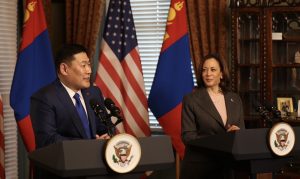The prime minister of Mongolia just visited Washington, D.C. – and no other country in our region is doing that right now. For Mongolia, it’s business as usual, because Mongolia is a functioning democracy and strategic partner to the United States. But this business as usual cannot be taken for granted.
Mongolia has a rather unique foreign policy called the Third Neighbor Policy. Having only two physical neighbors, China and Russia, the basis of this policy is to actively engage with countries beyond them – chief among them the United States.
Predictably, Russia and China have always been skeptical of the Third Neighbor Policy, to say the least. Under platitudes such as “friendship” and “eternal neighbors,” China and Russia have undermined, suppressed, and even attempted to sabotage Mongolian foreign policy in the past.
One key factor is that Mongolia, alone among the Central Asian countries, has demonstrated its commitment to a functioning democratic system. To save our democracy, Mongolia has no choice but to venture beyond our two geographical neighbors.
For its part, the United States has made no secret of the fact that its outreach to Mongolia is strategic. Investment and aid to Mongolia is designed to counter Russia and China’s dominance and support Mongolian sovereignty and security.
Mongolia and the United States established formal diplomatic relations in 1987; over the past three decades, Mongolia has been a reliable diplomatic partner of the United States. Although not widely known, Mongolia has been working with the U.S. on strategic issues for a long time now. Mongolia is one of NATO’s nine “global partners,” along with formal U.S. allies like Australia, Japan, and South Korea. Mongolia also actively engages in U.N. peacekeeping missions.
Starting in 2003, Mongolia contributed close to 1,200 troops to Iraq and 6,000 troops in Afghanistan, both U.S.-led wars. Almost 10,000 Mongolian peacekeepers have also served in South Sudan and elsewhere in Africa. For a country of only 3.5 million people, this is a tremendous commitment.
Now is the time to elevate cooperation at all levels. The United States should boost major investment and technology support that can strengthen the Mongolian economy. Without a sizable commercial and trade backbone, the bilateral relations could yield under pressure from Russia and China.
Prime Minister Oyun-Erdene Luvsannamsrai’s visit to Washington was an act of defiance. At a time when no leader of another Central Asian country has visited the United States in over five years, Mongolia is charting its own path. Thus Mongolia could serve as a model for engagement with the United States in the region.
Yet, when it comes to underpinning the bilateral relations with increased commerce and investment in Mongolia, the U.S. is seriously lagging behind.
In the past decade, Mongolia’s trade with China reached $85 billion; trade with Russia amounts to $17 billion. In comparison, trade with the United States was worth only $2.6 billion, over 30 times less than China-Mongolia trade. Even when the U.S. is trading with Mongolia, it is heavily imbalanced. In 2022, for example, Mongolia imported $375 million worth of goods from the United States, while exported goods were almost 30 times less than imported goods – only $12.7 million.
Understanding the strategic importance of bilateral trade, nine members of the U.S. House of Representatives have introduced a trade bill that aims to provide an import tariff waiver for Mongolian cashmere. Although the bill has been reintroduced now three times, it is going nowhere – mostly bowing to U.S. domestic sentiment against free trade.
When the situation is like this, it is hard to tell how long Mongolia could continue to stay defiant and fulfill its role as a strategic partner of the United States. Democracies function only when the people prefer democracy over authoritarianism. If the citizens of authoritarian countries are financially thriving, there is a risk of Mongolians finding Russian and Chinese economic and governance systems more enticing.
Exactly 20 years ago, Mongolia started to host a multinational peacekeeping operations exercise, Khaan Quest. Over the years, it has become an important platform for the armed forces of various countries to work together and learn from each other.
In this year’s Khaan Quest, militaries of 26 countries – including the U.S., Indian, and Chinese armies – trained together and befriended each other. U.S. Ambassador Richard Buangan excitedly noted that “militaries from the U.S. and China played a friendly game of basketball against a beautiful Mongolia backdrop.” This is not happening anywhere else in the world.
Mongolia is always ready to lend our “beautiful backdrop” to advance global peace and the rules-based international order. But we need the U.S. support to keep this backdrop free and democratic.

































